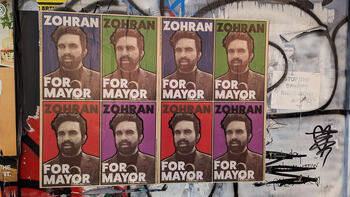
The likely election of Zohran Mamdani as New York City’s next mayor reflects a profound shift in generational politics. As the era of boomer domination finally draws to a close, a new cohort is bringing fresh energy to an already polarised landscape on both right and left – with potentially devastating results.
Diminishing economic prospects for younger workers have played a key role in undermining faith in free-market capitalism, making the case for socialism seem viable again. Cast largely in traditional Marxist terms, many on the reinvigorated left see the ‘cost of living’ focus as a promising strategy for progressives otherwise out of step on cultural issues.
Yet it would be wrong to view Mamdani’s rise as driven primarily by the working class. In the primary, he lost in many predominantly black and Latino areas such as the Bronx, Brownsville and Rosedale, and traditional working-class districts like Canarsie in south Brooklyn, all of which backed his rival, Andrew Cuomo. Mamdani’s support instead came largely from the gentrified zones of Lower Manhattan and brownstone Brooklyn, particularly Williamsburg, where a cadre of educated young voters drove record turnouts. A recent New York Times poll shows Mamdani with 73 per cent of the vote among 19- to 29-year-olds, compared with just 32 per cent among voters over 65. Only a massive mobilisation of older New Yorkers, who generally favour Cuomo, threatens his momentum.
Whether he wins or not, Mamdani epitomises a youthful politics defined by the primacy of social media. His followers tend to be less conventionally literate and more prone to political extremes. Their politics – epitomised by the media-savvy Mamdani – is largely performative, based more on emotion than on even remotely practical policy. His candidacy is merely the latest cause célèbre, following a sequence of ‘progressive’ enthusiasms from climate change to transgender rights to the Palestinian cause.
Some young activists also display a disturbing acceptance of political violence. A YouGov poll in September 2025 found that among adults under 30, 19 per cent said political violence could sometimes be justified, compared with 11 per cent of Americans overall. In one survey, nearly 38 per cent of respondents – and more than half of progressives – said the assassination of Donald Trump would be ‘justified’.
In this new political configuration, gender now plays a central role. The existence of a gender gap in politics is nothing new, but, according to recent Gallup surveys, it is now five times larger than in 2000. Indeed, it is especially pronounced among Generation Z where Trump’s approval rate among young men hovers near 45 per cent, compared with just 24 per cent among women.
The left is increasingly dominated by women. Among Americans aged 18 to 29, 52 per cent of women identify as Democrats, compared with 35 per cent of men, while 38 per cent of young men lean Republican – nearly twice the share of young women. A similar divergence has appeared abroad. In South Korea’s 2022 presidential race, 59 per cent of men aged 18 to 29 voted conservative, while women overwhelmingly backed the ‘progressive’ candidate. Across Europe, 21 per cent of young men support right-wing and populist parties compared with 14 per cent of young women.
Read the rest of this piece at: Spiked.
Joel Kotkin is the author of The Coming of Neo-Feudalism: A Warning to the Global Middle Class. He is the Roger Hobbs Presidential Fellow in Urban Futures at Chapman University and and directs the Center for Demographics and Policy there. He is Senior Research Fellow at the Civitas Institute at the University of Texas in Austin. Learn more at joelkotkin.com and follow him on Twitter @joelkotkin.
Photo credit: Eden, Janine and Jim via Flickr under CC 2.0 License.












